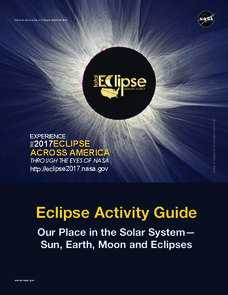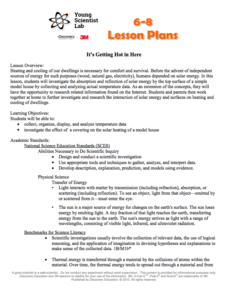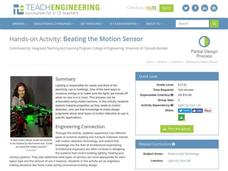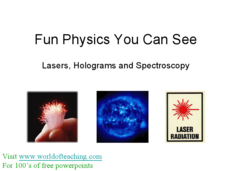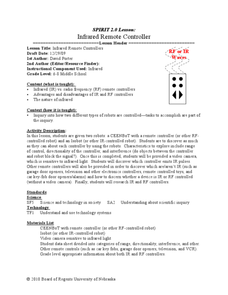National Wildlife Federation
Quantifying Land Changes Over Time Using Landsat
"Humans have become a geologic agent comparable to erosion and [volcanic] eruptions ..." Paul J. Crutzen, a Nobel Prize-winning atmospheric chemist. Using Landsat imagery, scholars create a grid showing land use type, such as urban,...
Beyond Benign
Climate Change Chemistry
Assist your class with learning the importance of caring for our environment as they complete this fun-filled lesson on climate change. Individuals perform simulations related to greenhouse gases, atmospheric gases, and the overall...
NASA
Blinded by the Light!
Pupils learn of multiple ways astronomers look for planets outside of the solar system. By completing a hands-on activity, scholars discover that trying to see the planets directly because of the glare from the nearby star is nearly...
NASA
Taking a Cold, Clear Look at the Universe
Take a look with another perspective. Pupils read to find out what portion of the electromagnetic spectrum a space telescope sees and the difficulties of viewing infrared radiation from other objects in space. Individuals discover how...
Glynn County School System
Multi-Wavelength Astronomy
Take a look at astronomy through the light lens. From radio to gamma, light waves exist in every corner of the universe. An enlightening PowerPoint presentation gives an overview of the different categories of light and then discusses...
Colorado State University
Can You See Beyond the Rainbow?
There's more to light than ROYGBIV! An enlightening laboratory investigation has learners explore the world of infrared light. When they use goggles that take away visible light, they experience how things look with only infrared light.
Concord Consortium
Sunlight, Infrared, CO2, and the Ground
How bright are your classes? An interactive lesson has scholars explore how light interacts with carbon dioxide in the air and the surface of the earth. They watch a temperature scale as light interacts with the environment.
NASA
Eclipse Activity Guide
Ever made solar s'mores? Or recreated the solar system using peanuts? Astronomers young and old investigate all things solar using a variety of activities. Explore how the sun works, types of light it emits, and methods of charting the...
Teach Engineering
Catching the Perfect SAR Waves!
Zero in on an interesting resource involving radar technology. Groups construct a radar sensing unit and learn to calibrate the system. Using the radar system and the Pythagorean Theorem, they calculate distances between objects.
Messenger Education
Sensing the Invisible: The Herschel Experiment
The electromagnetic spectrum includes everything from very powerful gamma rays (which are used to treat cancer) to much weaker radio waves (which include microwaves). Through a hands-on activity, scholars explore the temperature...
Discovery Education
It's Getting Hot in Here
Class members engage in a STEM experiment and investigate how materials affect heating in a house by creating models of houses and using different top surface materials. They record the temperature inside the models and consider what the...
Teach Engineering
Beating the Motion Sensor
I bet I can cross the room without having the lights come on. Class members set up an experiment in which they try to determine what materials will mask motion detected by a sensor. Groups predict how materials will interact with...
NASA
Collecting Electromagnetic Radiation
Astronomy is literally over your head, but this lesson will explain how we study it. Young scientists make telescopes, calculate and compare the light gathering power of lenses, and simulate detection of infared radiation....
Curated OER
Fun Physics You Can See
Fascinating aspects of electromagnetic radiation and its use in obtaining and transferring information are described here. Learners will find the connections to current technology interesting. Although the slides are text-heavy, they do...
Curated OER
The Greenhouse Effect
In this Earth Science worksheet, learners read about the Greenhouse Effect and the difference between natural and amplified warming. Following, they answer ten short answer questions related to what they read about global climate issues.
Mr. E. Science
The Nature of Electromagnetic Waves
Imagine a presentation that covers electromagnetic waves, electromagnetic radiation, radio waves, microwaves, the visible light spectrum, UV, X-ray, and gamma rays. Here's one. Packed with facts and colorful illustrations, 11-slide...
TryEngineering
Infrared Investigations
Students examine how infrared works with everyday items. In this investigative lesson, students examine how we use infrared in household items. They will conduct an experiment to create an infrared remote that works around corners as...
Curated OER
Spitzer Explores a Dusty Young Star
In this stars worksheet, high schoolers read about the Spitzer space telescope and they solve 5 problems about the mass, size, and power of dust grains and interstellar mediums detected by the telescope.
Alabama Learning Exchange
Light Is
Students explore the properties of light. In this light instructional activity, students investigate visible light by viewing a website, examining an electromagnetic spectrum chart, and observing light demonstrations. Students write...
Curated OER
Properties of Light
In this light spectrum worksheet, students will read a diagram and a chart listing information about the different types of light rays from Gamma rays to radio waves. Then students will write a short essay about a new life-form that...
Curated OER
Infrared Remote Controllers
Students differentiate the two types of remote controllers namely RF and IR. In this technology lesson, students test their properties using CEENBoT and Isobot. They present their findings in class.
Curated OER
The Invisible Zoo
Students differentiate cold and warm-blooded animals using infrared images. In this physics lesson, students compare the images formed by infrared and visible light. They explain how scientists use infrared technology to study animals.
Curated OER
Hubble Space Telescope Webquest
Learners research the Hubble Space Telescope. In this Hubble Space Telescope lesson, students complete a webquest about the Hubble Space Telescope.
Curated OER
Picture This!
Students compare and contrast different types of light on the electromagnetic spectrum. In this investigative lesson students create a photographic image that demonstrates the infrared, ultraviolet and polarization phenomena.









